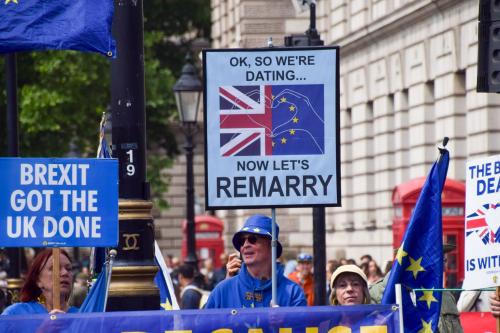On January 1 this year, the European Union included aviation within its cap-and-trade system (known as ETS), which prices carbon and caps the amount of CO2 that can be emitted annually. According to the legislation that extended the EU ETS to include CO2 emissions from aviation, all planes entering and departing EU airspace must now account for their CO2 emissions over EU airspace, the high seas and third country territories. Applying the EU ETS to both EU and non-EU airlines, however, has led to significant push-back from the U.S. Both U.S. Secretary of State Clinton and U.S. Secretary of Transportation LaHood have stated that they “strongly object on legal and policy grounds” to the application of the EU ETS to U.S. airlines and urged the EU to halt, suspend or delay its application. [1]
Congress has also been actively involved, threatening to make it illegal for U.S. airlines to comply with the EU ETS. Prohibiting compliance with another country’s laws is something the U.S. rarely does – the two most significant cases related to laws prohibiting compliance with the South African apartheid regime and the 1973 Arab boycott of Israel. In both these examples, compliance by U.S. persons would have breached domestic U.S. anti-discrimination laws. The U.S. position could therefore be understood as an effort to prevent U.S. companies complying with the laws of regimes that were, from a domestic view point, not only illegal but also particularly morally repellant.
The EU ETS does not fall into this category. In fact, Congress attempted to adopt a cap-and-trade system for CO2 emissions when the House passed a cap-and-trade bill in 2009. Moreover, California has introduced a cap and trade system and there is a cap and trade system already operating for CO2 emissions from electric utilities amongst northeastern states. Additionally, the congressional scheme would have also applied the domestic carbon tax to imports from countries that were not making a comparable effort in reducing their CO2 emissions.
Another important issue is the cost of prohibiting U.S. airlines from complying with the EU ETS. In the most recent U.S. legislative effort (the European Union Emissions Trading System Prohibition Act 2011, or Prohibition Act), the secretary of transportation is required to prohibit U.S. airlines from complying with the EU ETS when the secretary determines the prohibition to be in the public interest. The secretary is also required to take “other actions” that are in the public interest to hold airline operators “harmless from the emissions trading scheme”. Read together, these provisions indicate that the U.S. government, having decided that it is the public interest to prohibit airlines from complying with the ETS, should also find that it is in the public interest to reimburse airlines for penalties from their non-compliance.
So what are the costs of the ETS? Analysis by Merrill Lynch concludes that the costs to airlines of purchasing the carbon permits needed to comply with the ETS will add approximately $5.00 to ticket prices.[2] However, failure to comply leads to a €100 penalty per ton of CO2, plus the ongoing obligation for airlines to submit permits that cover their CO2 emissions. Whatever the final costs for complying with ETS are for airlines, the costs of non-compliance includes an additional €100 per ton of CO2 , and should the airlines fail to comply the EU can seize airline’s assets.
Secondly, there is the question of who will bear the costs of the ETS. In the event that the airlines comply, the costs can be expected to be reflected in ticket prices. Conversely, in the event that airlines are prohibited from complying with the ETS, the costs will not only be higher, but they would be borne by all taxpayers. In this sense, the Prohibition Act is also regressive as while airlines passengers tend to be more affluent, all taxpayers will be responsible for the costs of airlines non-compliance.
Prohibiting U.S. airlines from complying with the ETS might also have geopolitical implications. For instance, it could set a precedent for other countries to imitate when faced with an environmental scheme that places additional burdens on foreign businesses. And in this regard, India and China have already indicated they will prevent their airlines from complying with the EU ETS.
For these reasons, prohibiting U.S. airlines form complying with the EU ETS is bad policy. Instead of picking fights with the EU, the time and energy of Congress would be much better spent supporting U.S. efforts to negotiate an outcome with the EU on aviation emissions and in providing the tools necessary to reduce U.S. CO2 emissions from aviation such as through the development of biofuels, satellite navigation at airports, and R&D into new more fuel efficient aircraft.
[1] Letter dated 16 December 2011 from US Secretary of State Hilary Clinton and US Secretary of Transportation Raymond La Hood.
[2] Merrill Lynch, “Aviation in the EU ETS: An Incentive for Efficiency”, September 2008
The Brookings Institution is committed to quality, independence, and impact.
We are supported by a diverse array of funders. In line with our values and policies, each Brookings publication represents the sole views of its author(s).



Commentary
Op-edProhibiting Compliance with the EU Emissions Trading Scheme: Why This is Not a Good Idea
September 13, 2012